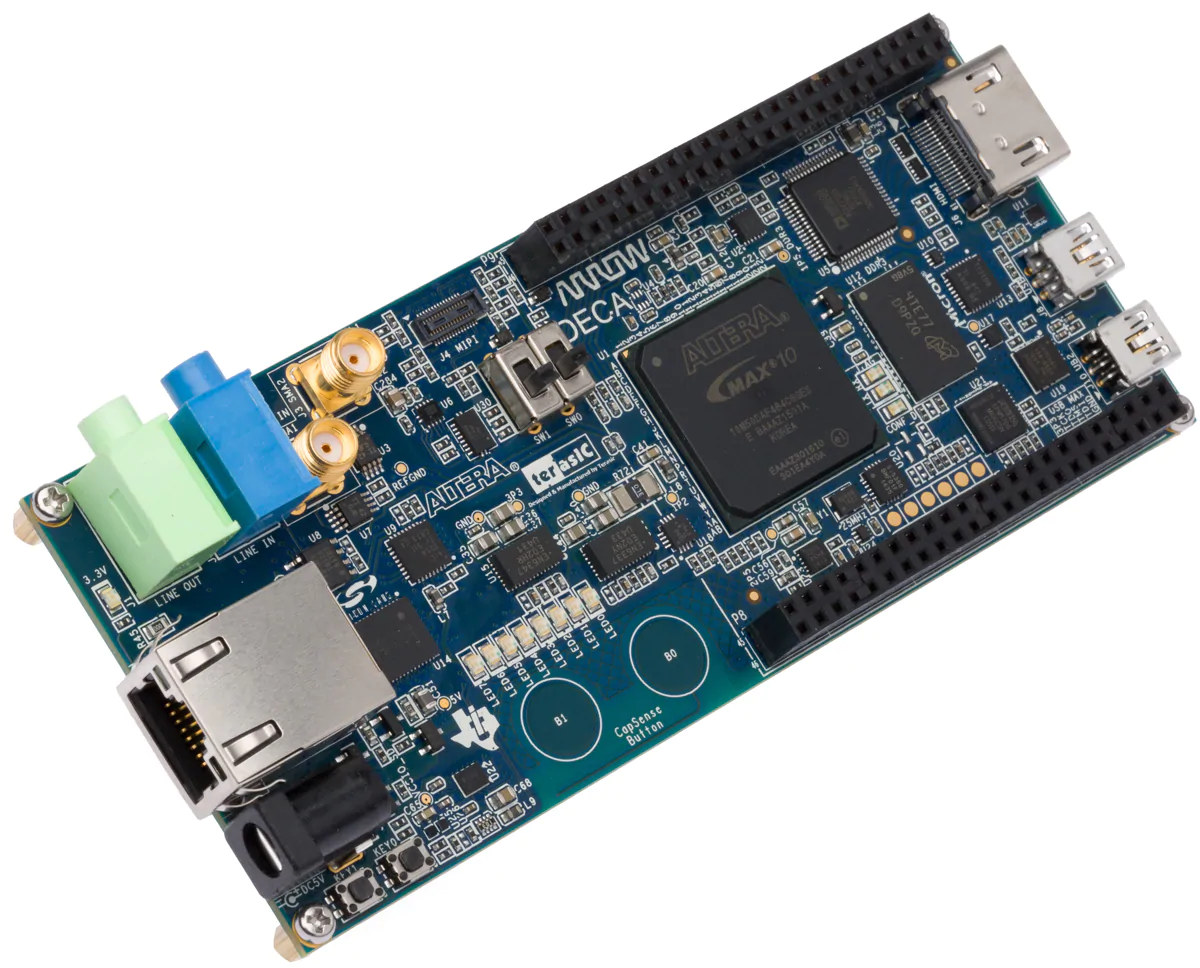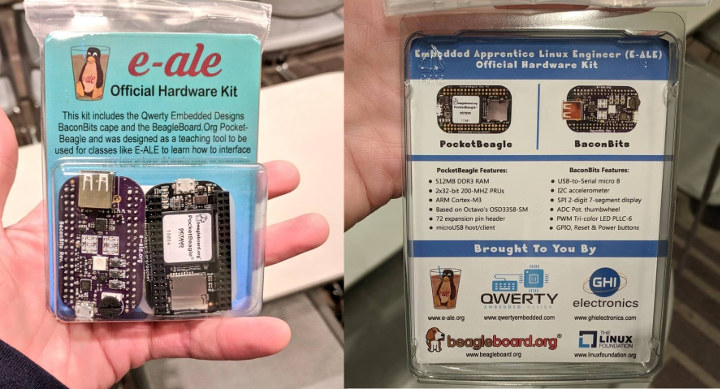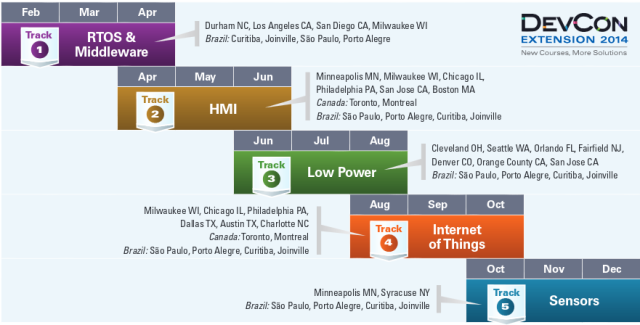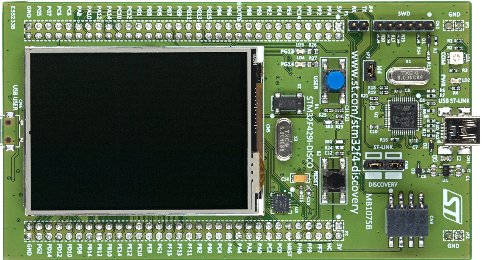Arrow DECA evaluation board, featuring Altera’s MAX 10 FPGA and Enpirion power solutions, was launched in March 2015 and sold for around $169 at the time. Time has passed with Intel purchasing Altera FPGA business later that year, and the price of the board dropped to $65 as listed on Intel website. But now Arrow is offered the DECA FPGA for just $37, and you can also get fast free shipping if you’re a member of ArrowPerks loyalty program. Arrow DECA development board specifications: FPGA – Intel MAX 10 (10M50DAF484C6G) device with 50K logic elements, 1,638 Kbit block memory, 5,888 Kbits user flash memory, 4x PLLs System memory – 512MB DDR3 SDRAM (16-bit data bus) Storage – 64MB QSPI Flash, MicroSD card socket Video Output – HDMI v1.4 including 3D video support Audio – 24-bit audio CODEC with line-in, line-out jacks Camera – MIPI connect for camera module Connectivity – […]
E-ALE is a Free & Open Source Linux Training Program for Embedded Engineers
As I wrote about the Embedded Linux Conference 2019 schedule a few days ago, I found out one of talk planned to use E-ALE hardware kit for the session. I had never heard about this kit, but a quick search led me to e-ale.org website which explains E-ALE stands for Embedded Apprentice Linux Engineer. The training program is made for embedded engineers with experience designing firmware for microcontrollers, but now need to transition to embedded Linux. Training only happens in-person (no webinar) at existing Embedded Linux conferences and is comprised of 8 to 9 seminars over 2 to 3 days. It usually starts with a presentation on one subject, followed by lab time to practice the relevant learned skills. The training takes place on the E-ALE kit at each conference, but it does not refer to a specific hardware platform. In most conferences, the PocketBeagle and BaconBits add-on board are […]
Renesas DevCon Extension Organizes Free One-Day Courses About IoT, Low Power, Sensors and More
I’ve just come across a YouTube video called Ultra-Low-Power Solutions for Wearable Technology and the ‘Internet of Things’ On Renesas channel. The video itself promotes Cymbet EnerChip Solid State Batteries and Kits, working together with Renesas MCUs, and the interesting part is that they’ll provide a free training session for the kit as part of Renesas Devcon Extension 2014. This is not a single event as you may think, but instead the company hosts one-day workshops in various cities in the US and Brazil covering various tracks all year long, as you can see in the simplified schedule below. RTOS & Middleware track is not available anymore, but you can still attend training sessions for Human Machine Interfaces, Low Power designs, the Internet of Things and Sensors. As an example, the following lectures are available for the Low Power track: Renesas Low-Power MCU Lineup (30 minutes) – Updated technology roadmap […]
Embedded Linux Conference 2014 Schedule
The Tenth Embedded Linux Conference (ELC 2014) will take place on April 29 – May 1, 2014 at the San Jose Marriott in San Jose, California. The event will feature 90+ sessions on embedded Linux, Android and IoT with over 450 attendees expected to attend. It will also be co-located with Android Builders Summit and the AllSeen Alliance Hackfest. Even if you can’t attend it’s still interesting to see what will be discussed at the event to get a grasp of on-going developments, learn a few things about different optimization techniques, and so on. So I’ve gone through the sessions’ description, and I’ve designed my own virtual schedule with sessions that could be of interest. April 29 9:00 – 9:30 – Keynote: The Paradox of embedded and Open Source by Tim Bird, Sony Mobile Linux has taken the embedded world by storm. Billions (with a ‘B’) of devices have now shipped […]
Free Online Courses & Workshops For ARM Cortex-M Microcontrollers
STMicroelectronics and Digikey are co-sponsoring an EE Times University online training course entitled “Fundamentals of Microcontrollers (MCUs): Hands-On Workshop”. The first two 45-minutes sessions will be theoretical and provide and overview of micro-controllers, and explain methods to select an MCU for a given project. The first 1,000 persons based in the US or Canada, who attended the first 2 sessions, will receive a free STM32F4 Discovery Board (ARM Cortex M4). The three next sessions, conveniently taking place about a week later, hopefully after you’ve received your board, will be an actual workshop with STM32F429 Discovery Board. Here’s the detailed schedule for the training: December 2, 2013, 12PM (Eastern Time) – Session 1 – Introduction to Microcontrollers Common microcontroller architectures Pipelining Peripherals: Timers, Communication, Analog December 3, 2013, 12PM (Eastern Time) – Session 2 – Selecting the Right Microcontroller 10 Steps to Selecting a microcontroller What to look for in a […]
AnDevCon IV Classes and Workshops Schedule
AnDevCon is a technical conference for software developers building Android apps, and the fourth Android developer conference will take place in San Francisco on December 4-7, 2012. The organizers have already listed the schedule, including details about the workshops and classes which will take place at the conference. The 4th of December is reserved for workshops, and the other 3 days can be spent on shorter classes. All workshops will provide sample code, as well as most classes, excluding the overview session and business related sessions. There will be three full day Android workshops: Android Development Boot Camp – Hands-on introduction to Android application development and the tools essential to the process. Beyond an introduction to the basics, this workshop also covers some of the common hurdles met with development, and how to overcome them. You will also have the opportunity to build an Android app of your own where […]
Using OpenOCD JTAG in Android Kernel Debugging – Android Builder Summit 2012
Mike Anderson, CTO and Chief Scientist for The PTR Group, gives a tutorial about Linux kernel debugging in Android with OpenOCD JTAG at the Android Builder Summit in February 2012. Abstract: Owing to the use of the Linux kernel, Android device drivers can be debugged using many of the same techniques as Linux. Still, much of the user-space interface code typically found in Linux is missing in Android. This complicates the debugging of kernel driver code. This presentation will demonstrate the use of the open on-chip debug (OpenOCD) software and an inexpensive JTAG to debug Android kernel code. The target audience for this presentation are platform developers looking to debug their kernel code such as device drivers. This presentation is targeted at intermediate-level developers with some understanding of kernel code development. You can also download the presentation slides on linuxfoundation.org website. Jean-Luc Aufranc (CNXSoft)Jean-Luc started CNX Software in 2010 as […]
Android Device Porting Tutorial – Android Builder Summit 2012
Benjamin Zores, Open Source Software and Multimedia Architect at Alcatel-Lucent, gives step-by-step to port Android to your own device at Android Builder Summit in February 2012. Abstract: This talk is presented as a step by step tutorial meant for Android platform rookies, as to discover all Androidisms one has to tackle down to bring his own custom device to life. Based on a real-life Android 4.0 ICS device porting experience, the talk will cover early board bringup (from U-Boot and Fastboot to Linux kernel and drivers), AOSP device integration, Android-specific device init customization, touchscreen input layer adaptations and Hardware Abstraction Layer (HAL) driver interfaces development. You can also download the presentation slides on linuxfoundation.org website. Jean-Luc Aufranc (CNXSoft)Jean-Luc started CNX Software in 2010 as a part-time endeavor, before quitting his job as a software engineering manager, and starting to write daily news, and reviews full time later in 2011. www.cnx-software.com









